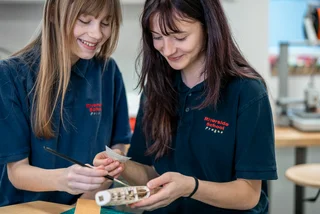We asked English teachers to tell us the most common mistakes their Czech students tend to make over and over. Here’s what they had to say:
“The most common mistakes Czech students make are the following.”
–Tracey Ennor, UK, Private English teacher
False friends
- Using “control” to mean “check”.
- For example: “I went to the doctor for control yesterday” or “Please can you control my writing.”
- Saying “concrete” when they mean specific. “I gave my husband concrete details and he still bought the wrong thing.”
- Also words like “accurate” vs. akorát (just enough).
Pronunciation
- The sound in “these” and “thought”: often pronounced as dese and dawt.
- “Bought” is often pronounced bawft.
- V and W: especially at the beginning of a word, think vork (work), vish (wish), and vhen (when).
“Even Czechs who have a good level of English make [tend to] make mistakes with prepositions, articles, and syntax.”
–Gillian Pritchett, UK, Business English instructor
Misuse of prepositions
- For example, if I asked a Czech if I was expected to come and teach this summer they would answer: “Yes I’m counting with you” rather than “I’m counting on you” or possibly “Yes, we’re expecting you.”
Word order
- Since Czech is less strict on word order syntax can be an issue. A good fix for this: Reading more in English helps as well as giving lessons that cover word order and doing drills.
Articles
- Often Czechs will start a sentence without an article and omit articles within sentences. For example: “Reason why I am leaving the college is that I was offered manager position.” This should be “The reason why I am leaving the College is that I was offered a manager position.”
Here is another example that includes all of my points: “I am sending you also activity of week 1 and week 2.” This should be “I’m also sending you the activity for week 1 and week 2.” These are genuine sentences that my students have used in emails to me.













 Reading time: 1 minute
Reading time: 1 minute 























